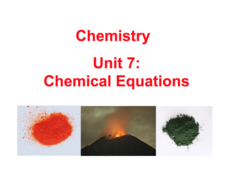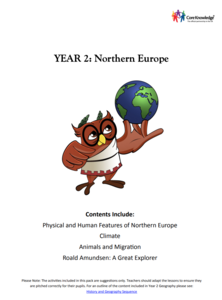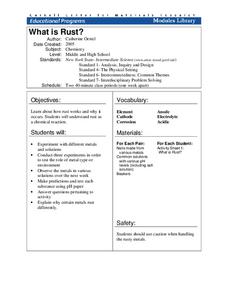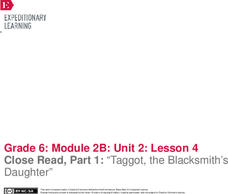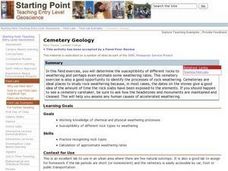Curated OER
Junior Solar Sprint Series: Gears and Drive Belts
Activate middle schoolers' minds with this physical science activity. Learners vary the diameter of gears and the number of teeth on them to find how energy output is affected. This writeup features well-developed background...
Curated OER
No Shadow of Doubt
Fifth graders must use a pencil to draw in the shadows they think will be formed by a house, a greenhouse, and a tree. The sun is behind each of these objects, and an open field is in front of them. That's where pupils draw their...
American Psychological Association
Resource Vetting Rubric
How do you assure that the resources you find for your classes are of good quality? Check out a vetting rubric that suggests eight questions to ask when considering lesson plans, activities, demonstrations, and pictures for classroom use.
Curated OER
Weather Challenge
For this identifying the weather terms activity, students read phrases about the weather and choose the term being described. Students choose 11 multiple choice answers.
Space Race
Sensory Detectives
Test your learners' sensory awareness with three hands-on activities that ask pupils to use their other senses to identify and describe everyday objects hidden from sight.
Normal Community High School
Chemical Equations
Viewers learn how to identify the substances in a chemical reaction, how to balance it, and the different types of chemical reactions by watching a presentation that also includes a review of monomers and polymers. The presentation...
Core Knowledge Foundation
Year 2: Northern Europe
How is life in Northern Europe different from other areas of the world? Historians journey through the various regions of Northern Europe discovering what type of climate, animals, and lifestyles exist in that section of the world. They...
Curated OER
Invertebrate Diversity
Comparative anatomy prevails in the lesson exploring diversity among invertebrates. Biologists examine physical characteristics of an earthworm from phylum annelida and a meal worm from phylum insecta. They also inspect a cricket and a...
Illustrative Mathematics
Lines of Symmetry for Triangles
What can symmetry tell us about triangles? After looking at four examples, learners will come to realize that lines of symmetry are different for equilateral, isosceles, and scalene triangles. Use this guided practice activity as an...
BioEd Online
Muscle Fibers
What better way to learn about muscle than by dissecting one? Using cow muscle (beef), learners compare bundles of yarn to muscle fibers as they explore each. The supplemental reading about astronauts losing muscle mass in space and what...
Curated OER
Earth's Water
If the majority of our planet is covered with water, why do we need to bother conserving it? With a thorough and varied investigation into the location and types of water on the earth, learners will gain an understanding of why this...
Cornell University
What Is Rust?
Why do metals rust differently? Scholars experiment with metal combinations in a hands-on activity. They create unique environments with different metals and compare the rate and amount of rust for each.
Curated OER
Magnificent Magnets
Learners identify the properties of a magnet. In this physics lesson, students explore the strength of the magnet by testing out how a magnet reacts to various materials. The various objects the learners test include paper clips, paper,...
Curated OER
2011 Nobel Prize Winners Announced
This assignment has young scientists read four different news articles about the 2011 Nobel Prize winners. Six questions are posed for children to write the answers. It is a relevant activity for getting middle schoolers to meet the...
Curated OER
Celebrating St. Patrick's Day with Dance
Celebrate St. Patrick's Day by teaching your class how to do an Irish jig. This type of dance is very fast. Break it all down and teach each section of the dance thoroughly. There are plenty of hops, kicks, toe touches, and stomps in...
Exploratorium
Hot Spot
Not only does a concave mirror focus light waves, it can also concentrate infrared radiation into a hot spot. If you have a small electric heater and such a mirror, demonstrate this for your physical science class.
American College of Sports Medicine
Selecting and Effectively Using Hydration for Fitness
How much water does your body lose during exercise? How much should you hydrate during and after exercise? Address the importance of hydration with your young athletes using this informative handout.
EngageNY
Close Read, Part 1: “Taggot, the Blacksmith’s Daughter”
There would be no luck if it were not for bad luck. Scholars take a close look at the theme of adversity through multiple reads of Taggot, the Blacksmith’s Daughter. They place sticky notes on important details of the story and complete...
Bully Free Systems
Bully Free Lesson Plans—12th Grade
Two sample lessons from a curriculum unit on bullying provide high school seniors with an opportunity to assess their online and cell phone behavior and to consider how they can offer support to bullied students. Each plan includes an...
Curated OER
Food Matters
Fifth graders identify physical and chemical changes. In this science inquiry lesson, 5th graders observe the changes that occur when making bread and butter. Students explain if the product is result of a physical or chemical change.
Curated OER
Cloud Sort
First graders gain a better understanding of types of clouds. They recreate clouds using Kidspiration. The types of clouds they study about are cirrus, cumulus, and stratus clouds.
Curated OER
Comparing Apples and Oranges
Fifth graders, in groups, examine different types of apples and how they are different. They also taste the differences of each apple. They use this lesson to explore how to make observations.
Curated OER
Cemetery Geology
Students examine the chemical and physical weathering process of different rocks in a cemetery based on dates on the stones. Students discover the susceptibility of different rock types to weathering.
Curated OER
The Science of Forensics
Students examine the importance of details in evidence gathering, as well as the relationship between chemistry, physics and biology. In this forensics lesson plan students divide into groups and look at fingerprints and fill out...





